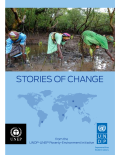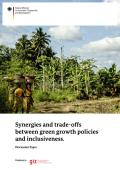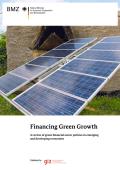
This publication brings together selected Stories of Change which we will hopefully catalyze and motivate governments, stakeholders, and the international development community at large to invest in, and support, poverty-environment mainstreaming across the globe as one element of the transition to an inclusive, green economy. Poverty-environment mainstreaming is a compelling and effective approach and set of tools and capacities for driving the institutional change which can –and ultimately will - deliver sustainable development.
These Stories of Change showcase that innovative and flexible ways of working can be the norm rather than the exception.
The booklet includes the following chapters:

Over the past 20 years, two major challenges have dominated international debate on sustainable development: the imperative of environmental protection and the eradication of all dimensions of poverty. Economic growth lies at the heart of both these issues. It is required to reduce poverty but, at the same time, needs to be decoupled from natural resource use and greenhouse gas emissions in order to preserve the livelihoods of current and future generations. Several concepts aim to reconcile this dilemma and offer much to delineate green and inclusive growth, many important aspects remain vague. However, it is important to facilitate a systematic assessment of interactions (i.e., synergies and trade-offs) between the green and inclusive dimensions of growth as it is a central concern of policymakers.

This study highlights the role of the entire financial system in the transition to a green economy and reviews green financial sector policies in emerging and developing economies. It focuses on the political and legal framework conditions, which are essential for a successful financing for green growth. On the basis of ten case studies in emerging and developing countries, the study investigates which strategies, policies and specific policy instruments have been applied at the national level, and how these have directly or indirectly influenced the actions of organisations operating in the financial sector. The study also aims to provide an analytical framework for key stakeholders (governments, donor institutions and the private sector), providing guidance before initiating and building a conducive framework for financing green growth.
Central banks have wide ranging effects on the economy and society as a whole. Their decisions on monetary policy and sustainability are closely intertwined but the links between the mandates, objectives and instruments of central banks and a broad sustainability agenda are rarely reflected in policy debates.
This report focuses on monetary policy and its sustainability impacts in Bangladesh. It lays out areas for exploration and provides initial insights into Bangladesh’s economic development, its sustainability priorities as well as its financial system, and the relationship between these aspects and the country’s monetary policy. It also reviews the mandate, objectives, targets, and instruments of the country’s central bank, as well as the effectiveness of the transmission channels at its disposal. At the same time, it highlights that knowledge gaps on the topic remain significant.

This report presents a model that analyses fossil fuel subsidy reform across 20 countries showing an average reduction in national GHG emissions of 11% by 2020, and average annual government savings of USD 93 per tonne of CO2 abated. With a modest recycling of resources to renewables and energy efficiency, emissions reductions can be improved to an average of 18%. Some countries have included reforms in Intended Nationally Determined Contributions, toward a climate agreement. The report presents case studies from Morocco, Philippines and Jordan and was authored by the Global Subsidies Initiative of IISD, as part of the Nordic Prime Ministers’ green growth initiative.
